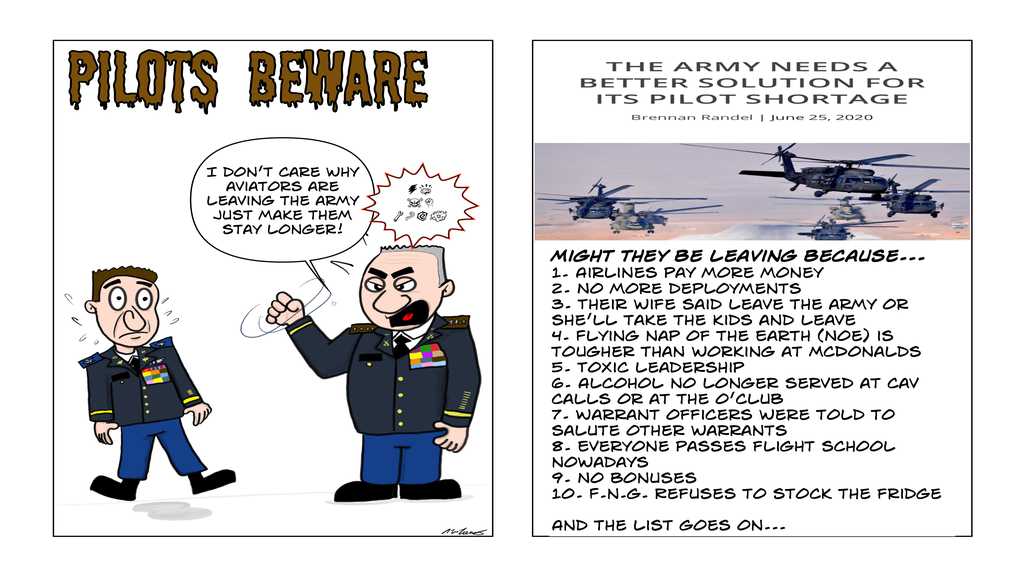Don't miss our flash to bang SALES!
Army Pilots Beware

According to a recent article the Army is struggling to retain its pilots. However, rather then investigate why the pilots are leaving in droves the Secretary of the Army decided to just change the Active Duty Service Obligation (ADSO) from six years to ten years following flight school. Not sure if that will work, might have been better to do some actual research and ask them? Link to full article on the topic: https://mwi.usma.edu/army-needs-better-solution-pilot-shortage/
The Great Army Pilot Exodus: Fix It with Paperwork!
The Army had a problem. A big problem. Its pilots were leaving in droves, and no one seemed to know why. Well, no one in the higher-ups, at least. The pilots knew exactly why they were bailing, but it wasn’t like anyone had asked them. Instead of holding some much-needed heart-to-hearts with the people who spent their days flying helicopters at breakneck speeds through combat zones, the Secretary of the Army decided to take a different approach. A bureaucratic approach.
“Sir, we have a situation,” said Colonel Stevens, standing in the Secretary of the Army’s office with a concerned look. “Pilots are leaving faster than we can train them.”
The Secretary, a man known for his decisive decisions (whether they were good or not was another matter), leaned back in his chair and tapped his pen thoughtfully. “Hmm. That’s concerning. What’s their current service obligation?”
“Six years, sir,” replied Colonel Stevens.
The Secretary nodded sagely, as if the answer had just been revealed to him by some ancient military oracle. “Well, there’s your problem. Six years is barely enough time to figure out which end of the helicopter is the front. We need to make sure they stick around longer.”
“Sir, with all due respect,” Stevens said cautiously, “maybe we should ask the pilots why they’re leaving? Conduct some exit interviews, perhaps?”
The Secretary waved him off. “No need for that. I’ve already got the perfect solution. We’ll just change the Active Duty Service Obligation from six years to ten years! That’ll stop them from leaving.”
Stevens blinked. “So… instead of figuring out why they want to leave, we’re just going to trap them for four extra years?”
The Secretary grinned. “Exactly! It’s like adding more fence to the chicken coop. The chickens might want to leave, but if you build the fence high enough, they’ll be stuck inside. Problem solved!”
Stevens rubbed his temples. “Sir, I don’t think pilots appreciate being compared to chickens.”
The New ADSO: Four More Years (Whether You Like It or Not)
Word of the new ten-year ADSO spread through the Army pilot ranks like wildfire. At first, the news was met with disbelief, then a collective groan, and finally… laughter. Because sometimes, all you can do is laugh when faced with the logic of military leadership.
In the break room at Fort Pilots-R-Us (which wasn’t its actual name, but that’s what the pilots called it), Captain Jake “Rotorhead” Davis was the first to break the silence after hearing about the new obligation.
“Ten years?” he said, staring at his coffee cup like it had just betrayed him. “They want us to stick around for ten years? Do they think we’re helicopters? Just crank up the rotor and we’ll keep spinning forever?”
Lieutenant Sam “Throttle” Thompson shook his head. “Man, I was already counting down the days to get out after six. Now they want me to add four more? I love flying, but this isn’t exactly the ‘Top Gun’ lifestyle we signed up for.”
Jake snorted. “Yeah, more like ‘Stop Fun’.”
The pilots in the room burst out laughing. It was true. Flying helicopters was a rush, but between the endless deployments, the maintenance headaches, and the fact that Army coffee tasted like someone had accidentally brewed it with motor oil, the allure of staying in for a decade wasn’t exactly overwhelming.
Exit Plan: Chicken Coop Logic
Over the next few days, the pilots at Fort Pilots-R-Us began brainstorming ways to cope with the new ADSO. The more rebellious among them joked about taking matters into their own hands.
“You know,” Sam said one afternoon, “if they’re going to keep us for ten years, maybe we should just start messing with the paperwork. Every time they ask me to re-up, I’ll ‘accidentally’ sign the wrong form. Oops! Looks like I accidentally signed the form that lets me leave.”
Jake grinned. “Or we could go full-on ‘chicken coop.’ Every time they try to talk to me about extending, I’ll just flap my arms and cluck like a chicken.”
“You’d get sent to the psych ward,” Sam replied, laughing.
“Hey, at least I wouldn’t be flying for ten years,” Jake shot back.
The Pilot Feedback the Army Didn’t Ask For
Of course, some of the more reasonable pilots thought maybe—just maybe—the Army should actually ask them why they wanted to leave after six years. And as luck would have it, Colonel Stevens had the same thought.
In a rare moment of defiance, Stevens called an impromptu meeting with the pilots to actually get their feedback—something the Secretary of the Army hadn’t bothered to do. As the pilots filed into the briefing room, Stevens stood at the front, looking slightly sheepish.
“Alright, everyone, let’s cut the formalities,” Stevens said. “I know you’ve all heard about the ten-year ADSO. I want to hear what you think.”
The room went silent for a moment before Jake raised his hand. “With all due respect, sir… it’s terrible. We’re not leaving because we don’t love flying. We’re leaving because we’re burned out. The deployments, the long hours, the lack of recognition—it adds up. And adding four more years to our obligation just makes it feel like we’re being punished for doing a job we love.”
Stevens nodded. “So, you’re saying it’s not about the flying itself?”
“No,” Jake continued. “It’s everything around the flying. The flying is great. It’s the rest that’s wearing us down. Instead of locking us in for longer, maybe they should fix the things that make us want to leave.”
Stevens looked thoughtful. “You know, that actually makes a lot of sense.”
Sam chimed in. “Exactly. Maybe if the Army treated us like people instead of gear they’re trying to keep on a shelf for as long as possible, we wouldn’t be counting the days until we can leave.”
Stevens smiled. “Well, that’s the kind of feedback we should have gotten in the first place.”
The Aftermath: Did It Work?
Colonel Stevens took the feedback back to HQ, armed with the knowledge that maybe—just maybe—pilots didn’t want to be locked into service like chickens in a coop. Unfortunately, by the time he got there, the Secretary had already signed off on the ten-year ADSO.
“We’re sticking with the ten years,” the Secretary said confidently. “It’s foolproof.”
“Sir,” Stevens replied, “I just spoke with the pilots. They said—”
“No need, Stevens,” the Secretary interrupted. “We’ve already fixed the problem. Besides, what could pilots possibly know about flying careers that I don’t?”
Stevens sighed. “Plenty, sir. Plenty.”
And as the Army pilots continued to fly (while secretly counting down the days until their newly extended release dates), one thing was clear: the chicken coop approach was never going to work. Maybe next time, they’d ask the pilots beforethey made the decisions. Or, as Jake liked to say, “At least give us actual wings if you’re going to keep us grounded for that long.”
The Frontlines
Check out the awesome selection of military-themed shirts, mugs, and posters at The Frontlines Shop—and don’t miss all the great stuff we’ve got on sale right now! Plus, believe it or not, some of the comics I whipped up during my 20-year military career have actually been published! These funny and sometimes edgy reflections are inspired by amazing mentors, great friends, and a deep appreciation for sarcasm. You can find them on Amazon The Frontlines
Popular Products
-

Nature’s Way
Price range: $19.50 through $28.00 Select options This product has multiple variants. The options may be chosen on the product page -

Warrant Officer Liberation Front (WOLF)
Price range: $19.50 through $28.00 Select options This product has multiple variants. The options may be chosen on the product page -

Keep Calm and Rescue On
Price range: $25.00 through $33.50 Select options This product has multiple variants. The options may be chosen on the product page -

Warrant Officer Definition Mug
Price range: $12.50 through $16.50 Select options This product has multiple variants. The options may be chosen on the product page




